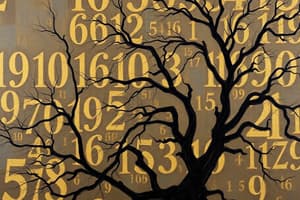Podcast
Questions and Answers
What type of numbers challenge traditional division operations, leading to Chrystopher Columbus Syndrome?
What type of numbers challenge traditional division operations, leading to Chrystopher Columbus Syndrome?
- Irrational numbers (correct)
- Imaginary numbers
- Rational numbers
- Whole numbers
Which number system extends beyond the real axis onto the imaginary axis?
Which number system extends beyond the real axis onto the imaginary axis?
- Irrational numbers
- Complex numbers (correct)
- Real numbers
- Whole numbers
What operation is introduced in complex arithmetic that enhances the ability to solve equations with roots of negative quantities?
What operation is introduced in complex arithmetic that enhances the ability to solve equations with roots of negative quantities?
- Multiplication of positive numbers
- Subtraction of complex numbers
- Conjugation of complex numbers (correct)
- Division of negative numbers
In the complex number system, what is the value of i squared (
{i}^2)?
In the complex number system, what is the value of i squared ( {i}^2)?
How does dividing by a real number close to zero affect the result in traditional number systems?
How does dividing by a real number close to zero affect the result in traditional number systems?
What is a straightforward extension of counting rules in the Integer System?
What is a straightforward extension of counting rules in the Integer System?
Which operation in the Integer System involves finding the difference and negating if necessary?
Which operation in the Integer System involves finding the difference and negating if necessary?
What kind of remainders can result from division in the Integer System?
What kind of remainders can result from division in the Integer System?
What makes division more complex in Rational Numbers (\(\mathbb{Q}\)) compared to addition and subtraction?
What makes division more complex in Rational Numbers (\(\mathbb{Q}\)) compared to addition and subtraction?
How do you maintain consistency with integers when multiplying fractions in Rational Numbers?
How do you maintain consistency with integers when multiplying fractions in Rational Numbers?
What is a key characteristic of natural numbers?
What is a key characteristic of natural numbers?
In integer operations, what happens when subtracting two negative numbers?
In integer operations, what happens when subtracting two negative numbers?
Which number system includes fractions, integers, and decimals representing fractional parts of integers?
Which number system includes fractions, integers, and decimals representing fractional parts of integers?
What is a defining feature of the natural number system?
What is a defining feature of the natural number system?
Which operation remains similar between natural and integer numbers?
Which operation remains similar between natural and integer numbers?
What type of numbers challenge traditional division operations in number systems?
What type of numbers challenge traditional division operations in number systems?
What is the result of multiplying \(2+3i\) and \(4-2i\) in the complex number system?
What is the result of multiplying \(2+3i\) and \(4-2i\) in the complex number system?
In the base-16 (hexadecimal) system, what does the number 'A3' represent in the decimal system?
In the base-16 (hexadecimal) system, what does the number 'A3' represent in the decimal system?
What is the result of \(5/7 - 2/7\) in the rational number system?
What is the result of \(5/7 - 2/7\) in the rational number system?
Performing operations on real numbers, which of the following statements is true?
Performing operations on real numbers, which of the following statements is true?
What is the result of dividing \(9 - 4i\) by \(2 + i\) in the complex number system?
What is the result of dividing \(9 - 4i\) by \(2 + i\) in the complex number system?
Flashcards are hidden until you start studying
Study Notes
Operations in Number Systems
Number systems have been essential tools of human civilization since ancient times, facilitating communication, calculation, and understanding of quantitative concepts. As we delve into this vast landscape of numbers, let's explore how various mathematical operations unfold within these different systems.
Integer System ((\mathbb{Z}))
Integers, such as (-2) or (89), constitute one of our foundational number systems. Here, addition and multiplication are straightforward extensions of counting rules, while subtraction involves finding the difference and negating if necessary. Division can also occur, though it may require us to consider both integer outcomes (e.g., (7 \div 2 = 3)) as well as fractional remainders expressed by rational fractions (e.g., (7 \div 3 = \frac{7}{3})).
Rational Numbers ((\mathbb{Q})): Fractions and Decimals
Fractions like (\frac{3}{4}) and decimal numbers such as (0.25) enrich the realm of numerical representation. Addition and subtraction yield new rationals, while division becomes more complex due to the possibility of zero divisors and non-terminating decimals. Multiplication remains consistent with integers once converting mixed numerals into improper ones beforehand.
Real Numbers ((\mathbb{R})): Integers, Fractions, and Irrational Numbers
Real numbers combine integral and fractional parts without any upper limit. These include irrational numbers like (\pi) and the square root of two, which challenge traditional division operations. For instance, dividing by a real number that is close to zero results in an infinite sequence of digits after its period, leading to Chrystopher Columbus Syndrome.
Complex Numbers ((\mathbb{C}))
This system extends beyond the real axis onto the imaginary axis, including i, where ({i}^{2} = -1). While operations involving real numbers carry over, complex arithmetic introduces unique properties—such as conjugate pairs and polar form representations—which enhance our ability to solve equations and manipulate functions containing roots of negative quantities.
By exploring these fundamental yet diverse structures, we appreciate the beauty and power of mathematics in providing flexible lenses through which we perceive and analyze our world.
Studying That Suits You
Use AI to generate personalized quizzes and flashcards to suit your learning preferences.




